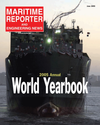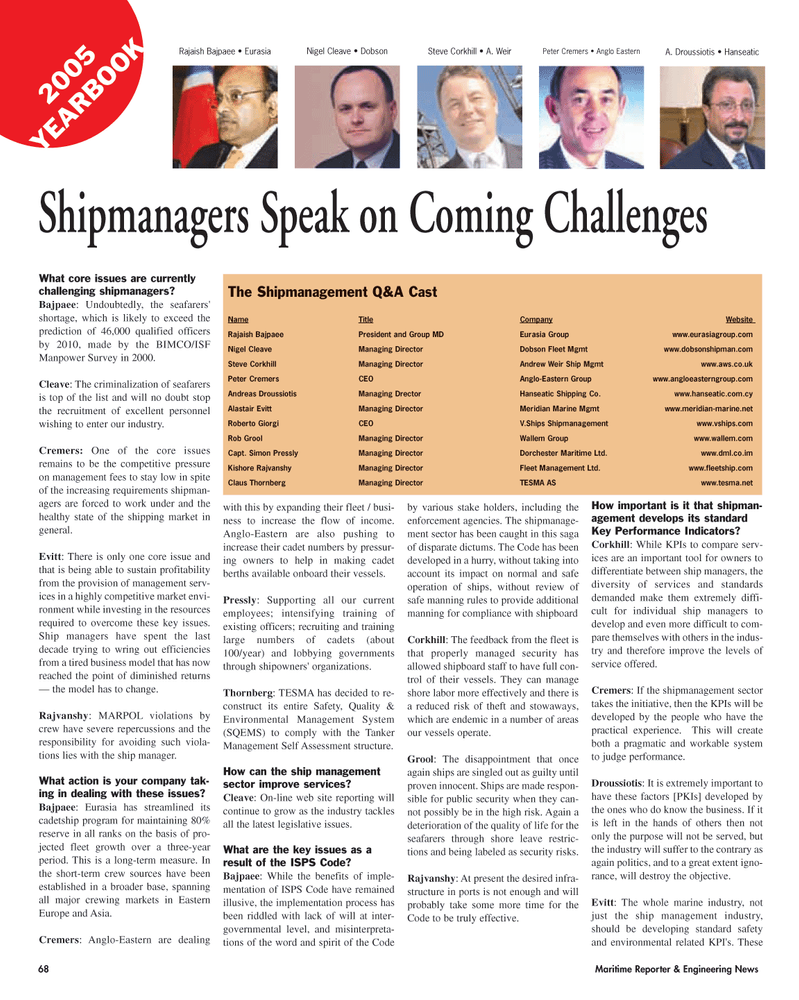
Page 68: of Maritime Reporter Magazine (June 2005)
Annual World Yearbook
Read this page in Pdf, Flash or Html5 edition of June 2005 Maritime Reporter Magazine
68 Maritime Reporter & Engineering News 2005
YEARBOOK
What core issues are currently challenging shipmanagers?
Bajpaee: Undoubtedly, the seafarers' shortage, which is likely to exceed the prediction of 46,000 qualified officers by 2010, made by the BIMCO/ISF
Manpower Survey in 2000.
Cleave: The criminalization of seafarers is top of the list and will no doubt stop the recruitment of excellent personnel wishing to enter our industry.
Cremers: One of the core issues remains to be the competitive pressure on management fees to stay low in spite of the increasing requirements shipman- agers are forced to work under and the healthy state of the shipping market in general.
Evitt: There is only one core issue and that is being able to sustain profitability from the provision of management serv- ices in a highly competitive market envi- ronment while investing in the resources required to overcome these key issues.
Ship managers have spent the last decade trying to wring out efficiencies from a tired business model that has now reached the point of diminished returns — the model has to change.
Rajvanshy: MARPOL violations by crew have severe repercussions and the responsibility for avoiding such viola- tions lies with the ship manager.
What action is your company tak- ing in dealing with these issues?
Bajpaee: Eurasia has streamlined its cadetship program for maintaining 80% reserve in all ranks on the basis of pro- jected fleet growth over a three-year period. This is a long-term measure. In the short-term crew sources have been established in a broader base, spanning all major crewing markets in Eastern
Europe and Asia.
Cremers: Anglo-Eastern are dealing with this by expanding their fleet / busi- ness to increase the flow of income.
Anglo-Eastern are also pushing to increase their cadet numbers by pressur- ing owners to help in making cadet berths available onboard their vessels.
Pressly: Supporting all our current employees; intensifying training of existing officers; recruiting and training large numbers of cadets (about 100/year) and lobbying governments through shipowners' organizations.
Thornberg: TESMA has decided to re- construct its entire Safety, Quality &
Environmental Management System (SQEMS) to comply with the Tanker
Management Self Assessment structure.
How can the ship management sector improve services?
Cleave: On-line web site reporting will continue to grow as the industry tackles all the latest legislative issues.
What are the key issues as a result of the ISPS Code?
Bajpaee: While the benefits of imple- mentation of ISPS Code have remained illusive, the implementation process has been riddled with lack of will at inter- governmental level, and misinterpreta- tions of the word and spirit of the Code by various stake holders, including the enforcement agencies. The shipmanage- ment sector has been caught in this saga of disparate dictums. The Code has been developed in a hurry, without taking into account its impact on normal and safe operation of ships, without review of safe manning rules to provide additional manning for compliance with shipboard
Corkhill: The feedback from the fleet is that properly managed security has allowed shipboard staff to have full con- trol of their vessels. They can manage shore labor more effectively and there is a reduced risk of theft and stowaways, which are endemic in a number of areas our vessels operate.
Grool: The disappointment that once again ships are singled out as guilty until proven innocent. Ships are made respon- sible for public security when they can- not possibly be in the high risk. Again a deterioration of the quality of life for the seafarers through shore leave restric- tions and being labeled as security risks.
Rajvanshy: At present the desired infra- structure in ports is not enough and will probably take some more time for the
Code to be truly effective.
How important is it that shipman- agement develops its standard
Key Performance Indicators?
Corkhill: While KPIs to compare serv- ices are an important tool for owners to differentiate between ship managers, the diversity of services and standards demanded make them extremely diffi- cult for individual ship managers to develop and even more difficult to com- pare themselves with others in the indus- try and therefore improve the levels of service offered.
Cremers: If the shipmanagement sector takes the initiative, then the KPIs will be developed by the people who have the practical experience. This will create both a pragmatic and workable system to judge performance.
Droussiotis: It is extremely important to have these factors [PKIs] developed by the ones who do know the business. If it is left in the hands of others then not only the purpose will not be served, but the industry will suffer to the contrary as again politics, and to a great extent igno- rance, will destroy the objective.
Evitt: The whole marine industry, not just the ship management industry, should be developing standard safety and environmental related KPI's. These
Rajaish Bajpaee • Eurasia Nigel Cleave Dobson Steve Corkhill A. Weir Peter Cremers Anglo Eastern A. Droussiotis Hanseatic
Shipmanagers Speak on Coming Challenges
The Shipmanagement Q&A Cast
Name Title Company Website
Rajaish Bajpaee President and Group MD Eurasia Group www.eurasiagroup.com
Nigel Cleave Managing Director Dobson Fleet Mgmt www.dobsonshipman.com
Steve Corkhill Managing Director Andrew Weir Ship Mgmt www.aws.co.uk
Peter Cremers CEO Anglo-Eastern Group www.angloeasterngroup.com
Andreas Droussiotis Managing Drector Hanseatic Shipping Co. www.hanseatic.com.cy
Alastair Evitt Managing Director Meridian Marine Mgmt www.meridian-marine.net
Roberto Giorgi CEO V.Ships Shipmanagement www.vships.com
Rob Grool Managing Director Wallem Group www.wallem.com
Capt. Simon Pressly Managing Director Dorchester Maritime Ltd. www.dml.co.im
Kishore Rajvanshy Managing Director Fleet Management Ltd. www.fleetship.com
Claus Thornberg Managing Director TESMA AS www.tesma.net
MR JUNE 2005 #9 (65-72).qxd 6/3/2005 11:10 AM Page 4

 67
67

 69
69
